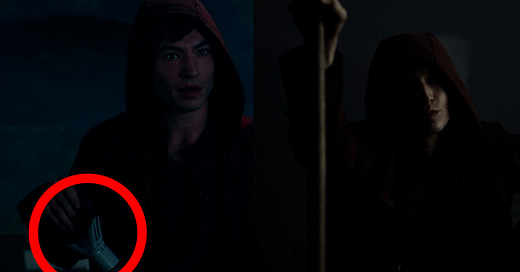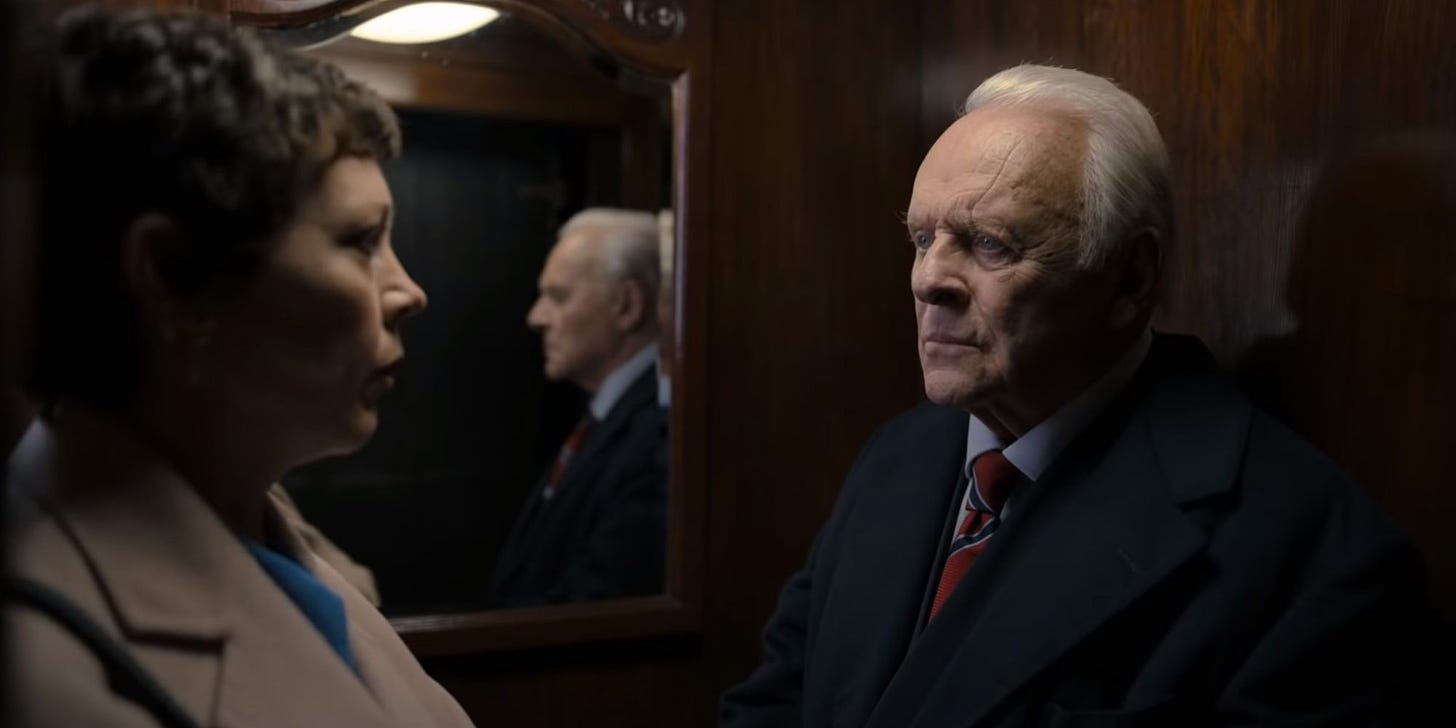Hi, Thomas Flight here- I make video essays about film and TV. This is where I write roughly twice a month about visual media, share additional background on my recent video essays, and recommend things I’ve been watching. If you’re interested in keeping up with my work and what I have to say about visual media, please consider subscribing.
The thumbnail I would have used if I was one of those channels.
In order to make my video comparing The Snyder Cut to the original theatrical release of Justice League, I watched the 2017 version the night before The Snyder Cut came out on HBO Max, and then The Snyder Cut the next day. Watching the two this way significantly informed how I perceived The Snyder Cut. I found Justice League (2017), an absolute bore and a total mess visually and tonally. So when I watched The Snyder Cut, I was pleasantly surprised to find myself watching a movie that was much better, for all the reasons I explain in that video.
But saying The Snyder Cut, is better than Justice League, is not the same as saying The Snyder Cut is a good or great film. So that’s what I want to address here: how I actually felt about The Snyder Cut on it’s own, and if Warner Bros. ever decide to give in to what the fans are demanding and release the Flight Cut of the film, what would it look like?
Recutting The Snyder Cut
One of the main points in my video is about the pacing of the two films. I argue that the theatrical version, in an attempt to achieve a two hour running time, cuts too much out, cramming a massive, complex story into as little time as possible, giving the characters no room to breath or develop. The Snyder Cut, on the other hand, allows for these things, and gives its story the room it needs- but it also does a lot more. I don’t think it really justifies its 4 hour running time. By the time it gets to the 3 hour mark, I’m starting to get a little exhausted. I can definitely see how someone who’s already invested in every one of these characters, or who’s just a fan of Snyder’s work or DC Comics generally would enjoy the full 4 hours, but I do think it would be a better film if it was trimmed down a little. (Spoilers ahead).
Does that contradict my critique of the theatrical cut? Isn’t reducing the running time exactly what lead to the issues I point out in the first place? Well… it’s a matter of degree and where the trimming is applied.
I’d maintain the longer and looser pacing of most of the scene in The Snyder Cut, so reducing the running time would mostly involve cutting out some of the additional characters.
So what would I cut? While I think the additional character development helps the story a lot, some of it is overly long. I think there are opportunities to slightly pare down Cyborg’s story while maintain its emotional impact.
While I love Willem Dafoe, Vulko is so forgettable I didn’t even remember to mention him in my comparison. I appreciate having additional Aquaman setup, but it doesn’t end up paying off at the end in a meaningful way. His character arc is better established, but not really resolved. The solution there would be to add even more stuff and that’s not really tenable in an already 4 hour film, I think the additional setup can get axed.
The Martha/Martian Manhunter plotline in The Snyder Cut suffers from the same underdevelopment that many of the characters in the theatrical cut do and so I’d give that character/subplot the axe (but retain normal Martha).
While I like the design and structure of the action scenes in The Snyder Cut slightly more than the theatrical versions. They still end up being pretty extended scenes of invincible bodies just smashing everything apart. I’d keep Synder’s versions of these action scenes over Whedon’s- but this is one area where I’d tighten the pacing a bit.
Finally that whole epilogue, with Joker and Lex Luther can go right in the trash bin. It adds nothing meaningful to the story, and it’s literally a throw-away dream sequence. From the most cynical view it really looks like an opportunistic stapling on of the Joker for the marketing benefits. (You think Synder and WB didn’t know how nuts the internet would go over just a few images of Leto’s new Joker after they endlessly dissected the last version?)
The notable exceptions to the characters getting the axe would be Silas Stone, who brings a lot of the film, and the additional baddies, Darkseid, and DeSaad, since having layers of villains made the evil forces feel more insurmountable.
Those are the broad strokes. I think most of those changes above would go a long way towards trimming some of the extra fluff and turning the film into a more focused, clear story while retaining what’s better about Snyder’s version.
Some Follow Up On Subjectivity…
In the last issue I talked about how I feel subjectivity is often left out of the discussion of film online. Commenter Dhruv Krishna Goyal left this response:
Great post! Though I thought people do acknowledge subjectivity more than you mention here. Maybe it's the Twitter crowd that "asserts" the "this is great/rubbish" with implications that anyone who thinks otherwise is wrong? Or maybe it's just that I'm blind to this attitude being a particularly relevant one...
Thanks for the comment! I think you’re right that there are certainly parts of the internet and film discussion that do include an acknowledgement of subjectivity, and I was probably painting with an overly general brush.
However, I want to clarify one thing. While I do sometime see an acknowledgement of individual subjectivity in some spaces (i.e. “oh, I’m just not into that” kind of thing), what I think is more often missing is the the nuance of subjectivity even within an individual- how even our personal experiences can vary significantly. The mood you’re in at the time of watching a movie, the circumstances of viewing the film, your age, etc., are all things that affect how you perceive a film. And are things that also change between viewings. Maybe I’m splitting hairs- but I do think it’s an interesting aspect of how we consume and perceive media that often goes unacknowledged, and something that I’ve noticed has often play a big role in how I judge a film.
Recommendation:
The Father (2020) was the last film I needed to watch to check off all of this year’s Best Picture nominees. I had heard barely any buzz about this film, and knew nothing about the plot, so my expectations were fairly low, other than expecting the usual greatness out of both Sir Anthony Hopkins and Olivia Coleman.
I ended up being really impressed, not just with the performances, but with the writing and editing as well. I went in totally blind, and I think that absolutely added to the experience, so I won’t discuss plot here. But I’ll say it’s a heartbreaking and sometimes difficult film to watch, but similarly to The Sound of Metal, another great film from last year, it uses subjectivity and perspective incredibly well to place the viewer inside a specific experience, creating empathy, and showing me another side of an experience that I’ve had some personal familiarity with.
It’s probably the least discussed of the Best Picture nominees mostly because it only recently became available online. But don’t think the lack of hype is due to a lack of quality. Check it out!
All the best,
TF





Thomas, huge fan, hey what other sources for more reading about cinema, current or past, do you recommend? I've gotten rather tired of the same "reviewers" I follow regularly.. Quality content like yours and that other great video essayists (Sideways, Breadsword, etc...) takes time I know, so what can you recommend in between your releases?